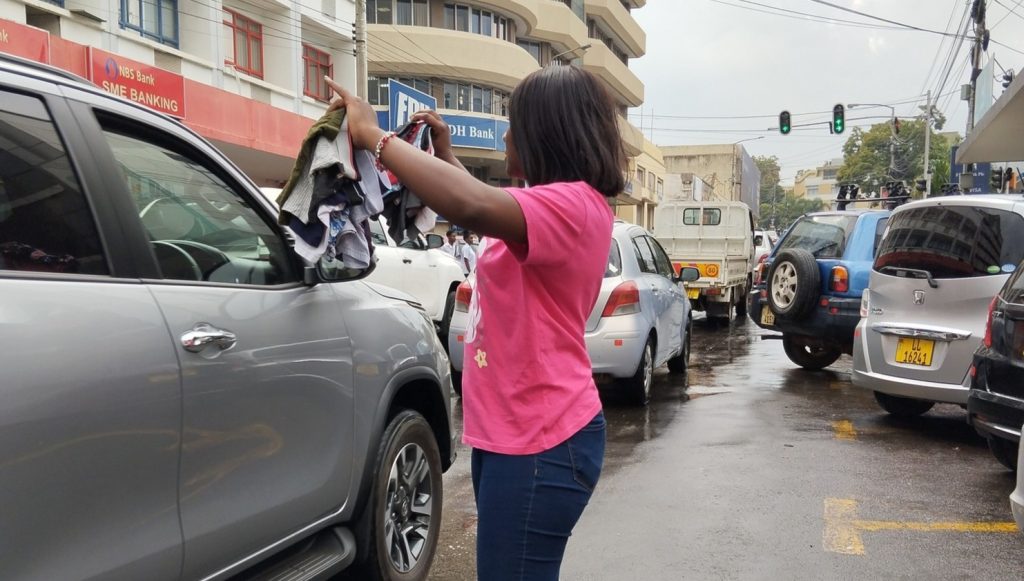From street vendor to graduate
For nine years, Rashina Samalani has been a street vendor fending for herself to survive. Regardless of such a tough life, she still pursued her goals, and now she can brag about being a graduate. But what is her story? Our News Analyst Lloyd Chitsulo, writes;
Life has been nothing but a struggle for Rashina Samalani, 25, who since 2016 has been selling second-hand boxers and slippers on the streets for survival.

But despite going through such a hardknock life, she still managed to put her focus on education, and now, she is a proud graduate of Mzuzu University.
She recently graduated from the public university with a Bachelor of Business (Tourism Management).
“I started with just K3 000 in 2016 when I was in Form Three, selling slippers to afford basic needs like lotion and sanitary pads. But with time, it became more than just survival.
“It became a passion. I saw that I could actually grow something from nothing. I started to see business as a tool for growth, independence, and empowerment,” she says.
Born and raised in Bangwe, Blantyre, Rashina came from a very poor background which deprived her of a proper upbringing; hence, vending on the streets so that she could meet her basic needs.

Raised by her grandmother whom she describes as a strong and loving woman, Rashina says she has had to endure a lot of hardships which nearly tore her apart.
With her grandmother roasting and selling groundnuts for a living, she could hardly afford basic necessities. The little that was earned from the daily sales of the roasted groundnuts was not even enough to take care of the household.
While others could step in to support her education, life was no fairytale for her.
She says: “We did not have much, but her [grandmother] determination and selflessness taught me a lot about survival and sacrifice. I was raised in a community where, like many girls, you had to learn how to stand strong even when the odds were against you.
“There was no room to be soft as life demanded strength, and from an early age, I knew I had to be resilient. My upbringing instilled in me a fighting spirit that has carried me through so many of life’s challenges.”
As she still managed to sail through education amid such hardships, life became more and more challenging for Rashina and the daily struggles prompted her to start a small business to keep her going.
Upon deliberation, she decided to start selling second-hand boxers in the streets of Limbe and Blantyre. By this time, in Form Three, she had saved up to K3 000 for the business.
Her business kicked off and through what she could earn, she could use the profits to support both herself and her grandmother. This could ease the burden that her grandmother had on taking care of her.
The small business complemented the groundnuts business for her grandmother and this was all the support the two ever had. At times, others would step in with numerous support, but the pair relied on one another for survival.
But regardless of such a tough life, Rashina says she wanted to make it in life and tell her story to inspire girls who often give up in life when facing such hardships.
And as she transitioned from secondary to tertiary level, she kept on selling in the streets so that she could afford the basic necessities, including upkeep since her grandmother could not afford to provide for her.
She never felt ashamed with her trade, especially that she was at a tertiary institution, and with time, it became more than a means of survival. While in the streets, she also made sure she excels in her studies which she felt was a key to her success.
Growing up in the midst of so many challenges, Rashina says she also faced a lot of invisible limitations, saying: “society has its own way of setting boundaries on what you can or cannot do.”
Rashina says there were constant comments suggesting that she should settle down or that education was not that much important to her, especially that she is a girl.
This is aside from the economic hardships that were one of the main hindrances to her education.
She says she has had to fight stereotypes and push through moments where she was expected to ‘play small’.
“There was also that silent pressure to prioritise marriage or domestic life over ambition. I faced comments questioning why I was bothering with business or education when I could just settle down.
“But I always believed in something bigger. I believed that girls can do more than what society expects of them—that we can lead, build, and make a lasting impact,” she says.
At times, she felt like giving up when things would go from bad to worse. She says most of the tough situations related to school, citing lack of upkeep which made it difficult for her.
She says one moment that really broke her was when she did not have money to pay for her hostel rental fee. She says she cried and questioned herself, wondering if it was all worth it and even thought about giving up on life.
She says: “But then I would remind myself what I wanted to be. I would picture the future I am working towards and the kind of life I wanted to create, not just for myself, but for those who believe in me. That vision kept me going even on the darkest days.”
Equally, selling on the streets has also had its own challenges. Aside from the different weather patterns, she says people have underestimated her, harassed her and even cheated her out of money.
Regardless of what she was going through in the streets, Rashina had to learn to be street-smart, to read people, and to trust her instincts. She had to keep learning and adapting.
To survive, Rashina also had to build professional relationships with loyal customers who would refer others to her, and such consistency and focus helped her push through even when conditions were not favourable.
Balancing her academic life and street vending had to also take a lot of discipline and sacrifice.
She says: “It was not easy, but I knew both school and business were important to me, so I made it work. Looking back, I am proud of how I managed to handle both.”
With all that she went through, Rashina feels much stronger and that she can do anything so long as her mind is really onto it.
She says it is something that will help her life and that of her grandmother.
She does not see the sky being the limit and this is why she wants every girl child to keep pushing and aiming for the moon.
To girls who are going through similar struggles, Rashina’s simple advice is that they should not give up. She says while the struggles may be real, their strengths are equally real.
She says: “You might not have everything you need now, but start with what you have. Do not wait for a perfect opportunity, create one.
“Even if it is just a small step each day, keep moving. Speak life over yourself, surround yourself with people who support your vision.”





